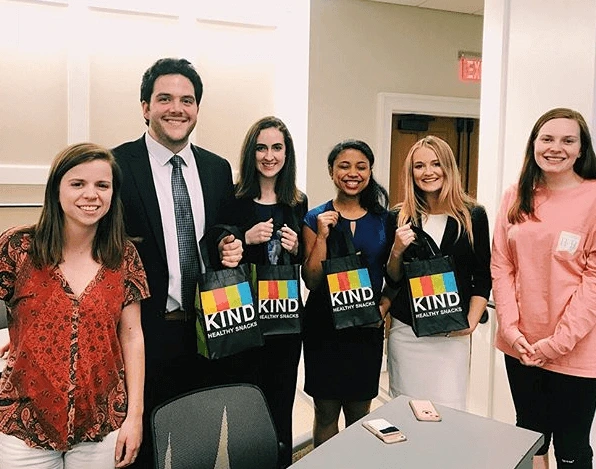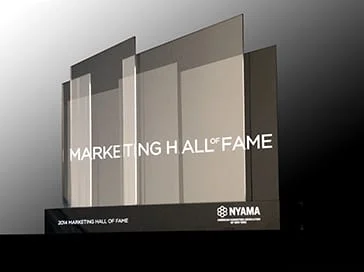Embracing the future of marketing, members and guests of the American Marketing Association New York gathered on May 11th to induct four outstanding marketers into the Marketing Hall of Fame:
- Jim Stengel (President and CEO, Jim Stengel Company, and former CMO of P&G)
- Jon Iwata (SVP, Marketing and Communications, IBM)
- Gary Briggs (VP, CMO, Facebook)
- Prof. Jerry Wind (Lauder Professor, The Wharton School).
All four spoke of their visions for the future of marketing and beautifully translated their experiences into insights that apply to a range of marketers from young professionals to the most senior executives.
Supporting the themes to come from the honorees was the feel of R/GA’s event space. Walking into the open, crisp and communal space the honorees and guests were presented with the sense of a whiteboard to map out the future. In his acceptance speech, Stengel stressed that marketers must all “get out more,” and the feeling of the R/GA space provided a powerful reminder that the right setting, combined with inspiring content and discussion, is crucial for marketers to think about the organization’s purpose and drive effective interactions both among employees and customers.
Our Best Marketing Tool Is Our People
Jon Iwata spoke to the value of an organization’s culture in transforming for the future by noting that, “our best marketing tool at IBM is our people.” But each honoree reflected in some way on the value of a brand’s culture and its people to be successful and impact the world.
Jim Stengel reminded the room to spend your life with people that you love and trust. The power of Proctor & Gamble’s culture is so renowned in the marketing world that companies from all industries have sought a P&G marketer to help lead their own marketing team. The strength of Stengel’s commitment to promoting the value of culture was evident from the dozen or so former P&G colleagues who were in the room to witness his induction.
“Are you a brand marketer or a performance marketer?” Briggs’s recalled Intel’s founder, Scott Cook, asking him once. While that distinction may have existed in the past, Briggs’s sees the future marketer as both. “A data-driven storyteller.” People and their stories are what makes the massive amounts of data marketers can now collect truly actionable.
The event energy in the room spurred a sense of gathering and sharing ideas, hinting at the value of open discussion vs. behind closed doors decision-making. This feeling complemented Jerry Wind’s call for companies and brands to think in terms of co-creation with their consumers. The future of marketing goes beyond thinking of communications and product development as something done internally, to something that finds ways to bring users inside to help craft products, services, and brands from the ground up.
Companies and Marketers Must have a Purpose
There is no doubt that the term “purpose” has become a buzzword in the marketing and brand building sphere. But rather than feeling overused, it was a dominant call to action from all four of the honorees.
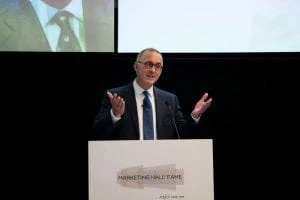
In his introduction of Jon Iwata, Seth Farbman, CMO of Spotify, highlighted Abraham Lincoln’s famous quote, “Character is like a tree and reputation like a shadow. The shadow is what we think of it; the tree is the real thing.” Farbman reflected that Iwata’s creation of IBM’s “smarter planet” campaign helped its reputation, but was also powerfully affected the character of the company.
Iwata reflected on how companies that truly create an ethos, like Apple or Nike or Disney or Virgin, are able to provide their own meaning to any category or brand that they choose to tackle. “If I said, ‘behind this curtain is the Apple Car,’ we might not imagine it perfectly, but we’d be pretty darn close.” The brand transforms the thing.
And finally, Wind challenged marketers to always meet three aims: 1) drive long-term shareholder value, 2) deliver on the needs of the consumer, and 3) deliver on the needs of society. He urged the room always strive to deliver on all three of these aims, and in partnership with the Tribeca Film Festival is creating a “triple win” awards event to honor the brands, people, and companies that are doing just that.
Respect and Enable an Empowered Consumer
Inevitably a discussion about the future of marketing entails a discussion about the two-way communication that we now live in between companies and their brands and consumers and other stakeholders.
Iwata noted that people are sharing a remarkable amount of data with companies now — where they walk, what they buy, what they watch, who they influence – which makes it an incredible time to be a marketer. But he cautioned that the reverse is true as well. People are looking at everything companies do as well — how they treat customers, employees, suppliers, and the planet. So he urged organizations to use consumer data to provide convenience, better service, and more value to consumers – while treating their data responsibly — or this flow of information will likely disappear.
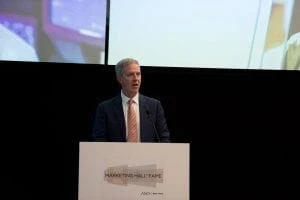
Companies and marketers should stop thinking about people just as consumers, urged Wind, and instead recognize that they are “empowered and skeptical people who have multiple roles of consumer, producer, employee, entrepreneur, spouse, parent, citizen, and friend.” Thus, people aren’t bound by any expectations of an industry. Any organization that provides them a more effective and valuable product or service, raises their expectations for all organizations to do the same. He also stressed that companies must continue to work towards greater integration of all the aspects of their company that affect how it builds touchpoints its stakeholders — R&D, IT, operations, logistics, finance, accounting, HR, leadership, and strategy all need to be incorporated into marketing.
Stengel’s acceptance speech was more geared towards career reflections and advice, but he still broached an important two-way communication issue for marketers and business leaders; to work for great bosses and to be a great boss. He fully recognized that this can’t always be controlled, much like every perception a person has of a brand, but he noted how important it was to seek out bosses who are good communicators and supporters, and how you must then reflect that back as a boss, because “There is nothing more lasting and powerful than bringing out the best in everyone you.”
Move Fast Toward the Future of Marketing and Don’t Fear the Flaws
Finally, each honoree called on businesses and marketers to move faster, and be accepting of the flaws or failures that might come from that.
Iwata noted that when he was searching for a new agency partner in 1994, brand consultancies were telling him that IBM had a negative brand value. “How’d you like to win that account?” he quipped. But in the end Shelly Lazarus and Ogilvy did, and they have been strong partners for over two decades rebuilding the brand from the inside and out.
Both Briggs and Stengel pressed firms to move faster. As Stengel noted, “Large organizations can rock the world,” but there is a tendency towards being indecisive that is almost like a disease. Briggs detailed how fast the world is now changing, how new technologies and ideas are more rapidly adopted than ever, and that companies must move just as fast or they will be disrupted by others who do.
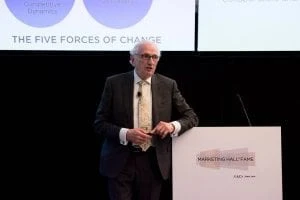
Stengel concluded by noting, “I’m not perfect. We are all flawed leaders.” But for all marketing leaders, such flaws are overcome by working with purpose, with an open platform of communication, supported by data and insights, and executed quickly through experimentation and an acceptance of failure and learning.







